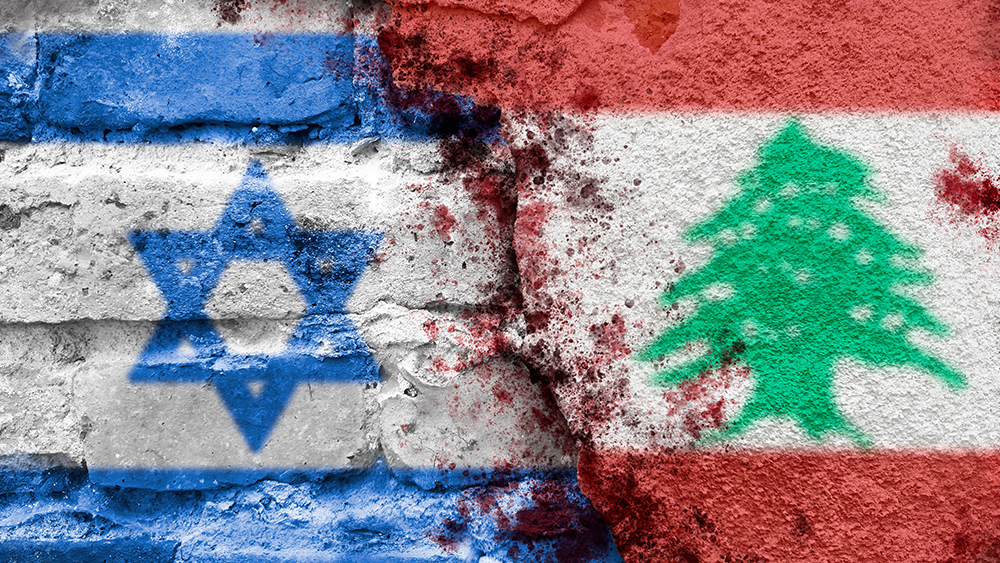
Israel did not provide evidence for its claim that the "treasure" was being kept in the hospital bunkers. Instead, it published an animated graphic and said they had previously been used to hide Hassan Nasrallah, the former secretary general of Hezbollah. The nation reportedly asked the Lebanese government to confiscate the money and gold it said the Shia militant organization had stolen from the people. (Related: Hezbollah leader Hassan Nasrallah reportedly agreed to a ceasefire before he was ASSASSINATED by Israeli military in Beirut.)
After a while, journalists and cameramen opened drawers filled with scrubs and bed linens, rummaged through boxes of surgical tools and meandered through the basement of the hospital, entering even its morgue and toxic waste closets.
A few moments later, Tel Aviv issued a series of warnings to residents nearby that it would begin striking buildings in the area and that they should move at least 500 meters away. Airstrikes began about an hour later.
One strike hit just in front of the entrance of the Rafik Hariri University Hospital, the largest public hospital in Beirut – leaving at least 18 people dead including four children. About 57 were reportedly injured. The hospital also suffered "major damage" from the blast.
"When we first received the news we were in shock," a nurse and educator at the hospital, Halimah el-Annan, told Middle East Eye (MEE) from one of the ground floor examination rooms. Annan has been working at the university hospital for nearly 40 years. During this time, she said, she had never seen or felt any sort of construction or movement below her.
"This is a private hospital belonging to the Alame family, which has no relation to Hezbollah, the Amal party, or any other political party," Annan said. "Sahel Hospital is a civilian hospital. It must continue its work."
Annan, like other doctors and nurses MEE spoke to, doubted that Hezbollah would keep money underneath the hospital, putting at risk the patients' lives.
"Hezbollah wouldn't risk sick people's lives, they might have their own [storage] places, but not in hospitals where there are patients and people," she said.
Ramzi Kaiss, a Lebanon researcher with Human Rights Watch (HRW), told MEE that, "Medical facilities, such as hospitals, have special protection under international humanitarian law (IHL), so they cannot be attacked."
"They cannot be attacked unless the facility is being used to commit -- outside of its humanitarian function -- attacks that are harmful to the enemy. The presence of millions of dollars of cash or gold underneath the hospital does not result in the hospital losing its protection," he added.
Lebanese Army launches investigation into hospital strike
The Wall Street Journal (WSJ) reported that the Lebanese Army already launched its probe into the claims U.S. Defense Secretary Lloyd Austin expressed last week.
Israeli officials have stood by their allegation, saying that military intelligence found the presence of the bunker full of cash and gold. They said that their intelligence has penetrated Hezbollah thoroughly, pulling off deadly attacks with explosive-laden pagers and walkie-talkies and killing much of the group's leadership including Nasrallah inside a bunker.
"The Israeli air force is monitoring the compound, however, we will not strike the hospital itself," Israeli military spokesman Daniel Hagari said during a news conference on Monday, Oct. 21, a few days before the airstrike.
During the news conference, Hagari showed a video that Israel created to illustrate the bunker below Al-Sahel hospital and said it includes "rooms, beds, and infrastructure for long stays and the ability to direct combat from underground," and a vault with hundreds of millions of dollars in cash and gold.
WSJ reporters visited both Al-Sahel Hospital and one of the two adjacent buildings where the Israeli military said the tunnel could be entered. They found the door of a nonfunctioning elevator in the basement location where Israeli officials said one entrance would be.
Al-Sahel's director general, Dr. Mazen Alame, called the allegations about a Hezbollah bunker with money under his hospital false. He called the allegations "a direct threat not only to us but to the health system in Lebanon. It's like dominoes. If we close, the other hospitals will start to close."
"Hezbollah doesn't want you to find the money, so they are likely blocking and hiding the entrance to the bunker in various ways, possibly by building walls to obscure the entrances to the bunker," said Nadav Shoshani, another Israeli military spokesman.
But Alame and other hospital officials said they had seen no evidence of any tunnels underneath the hospital and adjacent buildings, which they said also house offices of people opposed to Hezbollah. The private hospital isn't affiliated with Hezbollah or any other political party and also functions as a teaching facility.
Head over to IsraelCollapse.com to read more about the multifront war Israel is waging against Middle Eastern nations.
Sources for this article include:
TheGuardian.com
MiddleEastEye.net
WSJ.com
Source link

